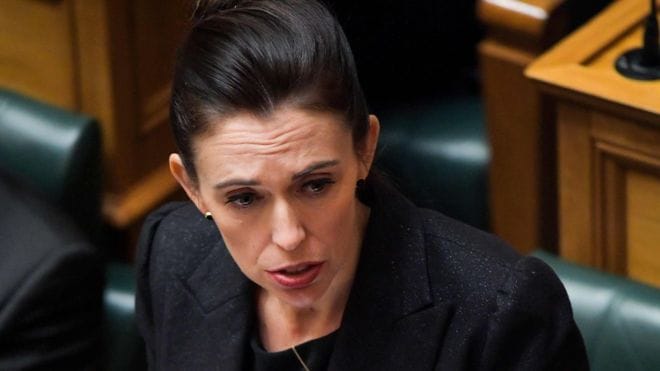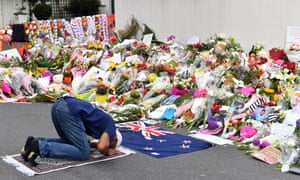
Ardern says she will never speak name of Christchurch suspect
New Zealand leader calls on public to speak names of mosque attack victims instead
Jacinda Ardern has said she will render the person accused over the Christchurch terrorist attack “nameless” and urged the public to speak the victims’ names instead.
Addressing parliament for the first time since Friday’s attack, the New Zealand prime minister said the accused would face “the full force of the law in New Zealand” but that she would never speak his name.
Opening with the Arabic greeting “as-salaam Alaikum”, she said the day of the attack would “now be forever a day etched in our collective memories”.
“He sought many things from his act of terror but one was notoriety, that is why you will never hear me mention his name,” she said of the gunman. “He is a terrorist. He is a criminal. He is an extremist. But he will, when I speak, be nameless.»
“And to others, I implore you: speak the names of those who were lost rather than the name of the man who took them. He may have sought notoriety but we, in New Zealand, will give nothing – not even his name.”
Fifty people were killed in the attack, and nine more remain in a critical condition in Christchurch hospital.
Earlier, Ardern told reporters outside a caucus meeting in Wellington she was concerned the gunman’s decision to dismiss his lawyer and represent himself in court meant he would attempt to use the trial to spread his political views.
Brenton Tarrant a 28-year-old Australian, has been charged with one count of murder and appeared briefly at the Christchurch district court on Saturday.
He was appointed a duty lawyer but dismissed him that afternoon. The Guardian understands he told the lawyer that he intended to represent himself and did not fill out a form requesting legal aid.

Asked by reporters if she was concerned he would attempt to use his trial as a platform, Ardern said she assumed that was his intention but hoped the media would deny him that kind of coverage.
The government was expected to announce changes to its gun laws before Monday, with Ardern telling reporters that cabinet had already decided on the changes and there was “a sense of urgency” and resolve that the reforms would not be derailed by the pro-gun lobby.
“We do have legitimate and responsible gun use, particularly in our rural community,” she said. “My view is that those gun owners will be with us, that is my absolute belief.”
There are already reports of farmers handing in their rifles in the wake of the attack.
The foreign minister, Winston Peters, will fly to Jakarta on Tuesday night as part of a visit to Indonesia and Turkey to convey New Zealand’s deepest sympathies to those countries. He told the New Zealand Herald that many of those killed or injured in the attack were either from, or had family in, Indonesia.
Meanwhile, Ardern is to return to Christchurch on Wednesday, when the burials for the 50 people killed in the worst terrorist attack in New Zealand’s modern history are expected to begin.
Armed police patrolled Memorial Park cemetery on Tuesday, while gravediggers could be seen preparing the ground.
The cemetery is 2km from Linwood mosque, where seven people were shot dead. At Al Noor mosque, where most of the 50 victims were killed, police were collecting flowers left by the public and pinning them on the fence. Paper chains left by school students read “we are one people” and “I am sorry we could not keep you safe”.
In her parliamentary statement, Ardern highlighted the bravery of two men inside Al Noor mosque: Naim Rasheed, who died trying to wrestle the gun from the shooter; and Abdul Aziz, who threw a card payment machine at the gunman to chase him away “and no doubt saved many with his bravery”. Both men were originally from Pakistan.
She also mentioned Haji-Daoud Nabi, 71, who was shot dead after opening the doors of the mosque and saying: “Hello, brother”.
“He had no idea of the hate that sat behind that door,” Ardern said. “But his welcome tells us so much – that he was a member of a faith that welcomed all its members, that showed openness and care.”
Ardern said the right to safety included the right to be “free from the fear of those sentiments of racism and hate that create a place where violence can flourish”, and that racism did exist in New Zealand.
The government has established an independent inquiry into how its intelligence and security agencies failed to prevent the attack, including whether they failed to appropriately heed warnings from the Muslim community about an escalation in threats of violence.
However, the justice minister, Andrew Little, rejected criticism of the intelligence agencies GCSB and SIS, telling TVNZ1 they had followed up “each tipoff they got that related to extremism of whatever form”. The GCSB confirmed late on Monday it had not received any relevant information or intelligence before last week’s shooting.
Ardern said she had spoken to her British counterpart, Theresa May, about taking global action against the failure of Facebook to prevent the attack being livestreamed. On Monday, Facebook told authorities it had deleted 1.5m copies of the video but it still remained in circulation.
Ardern said social media companies “are the publisher, not just the postman”.
Facebook said in a statement the video was viewed fewer than 200 times during the live broadcast and no users reported the video while it was streaming.